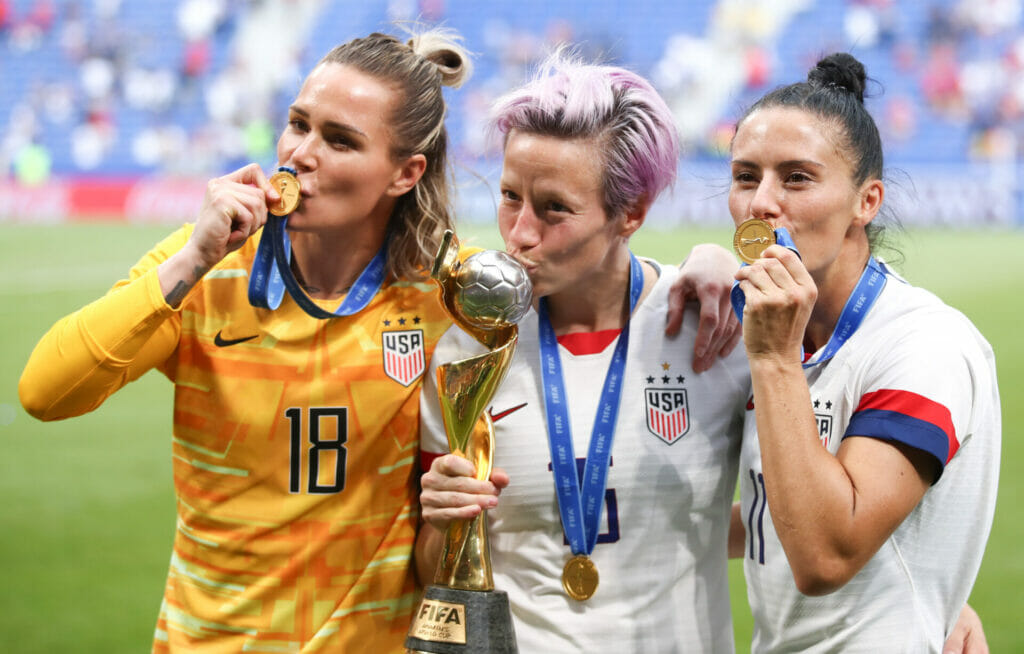The 2023 FIFA Women’s World Cup hosted by Australia and New Zealand is kicking off this Thursday, July 20th, with the American team playing their first game on Friday.
Currently featuring 91 openly LGBTQ athletes, the number of out competitors in the 2023 Women’s World Cup is more than doubled that of the 2019 Women’s World Cup and continues to grow. This is a record high compared to previous FIFA tournaments. While the number of teams has expanded by a third, the dramatic increase illustrates a significant growth in acceptance of LGBTQ participation in sports. 40 percent of the Australian team is a part of the LGBTQ community, having the highest number of out players. Brazil, Ireland, and Switzerland also have a significant number of openly LGBTQ athletes. The United States has three LGBTQ players: Megan Rapinoe, Kristie Mewis, and Kelly O’Hara.
Megan Rapinoe, a two-time World Cup champion, and trans rights activist, announced her retirement early this July and will compete in her fourth and final World Cup. Throughout her career, Rapinoe has been an influential force in the athletic community. She inspired other athletes after she came out in 2012 and has since been a tremendous advocate for women’s equality in soccer as well as LGBTQ inclusion in sports. Rapinoe successfully led the fight against the US Soccer Federation to bridge the pay gap between men and women soccer players, achieving equal pay for women soccer athletes in 2022. Presently, Rapinoe is a leading advocate in support of trans youth playing in teams consistent with their gender, encouraging others to get involved in the fight against the surge of US state legislation restricting trans rights.
Today, politicians in DC are claiming to “protect women’s sports” by pushing a trans & intersex sports ban. Call your Congressional rep today to say women’s sports need protection from unequal pay, sexual abuse & lack of resources, NOT from trans kids. #LetKidsPlay
📞202-224-3121— Megan Rapinoe (@mPinoe) March 8, 2023
Sarah Kate Ellis, President and CEO of GLAAD, released a statement earlier this year in response to the U.S. House vote in favor of HR 734 which would prohibit transgender girls from participating in school sports:
“Right now, gun violence is the number one cause of death to American children, yet extremist lawmakers ignore this reality to push bills that further endanger and isolate LGBTQ youth who just want to be themselves and play with their friends. Legislators have an obligation to stand up for all, not just some, of their constituents. Allowing students to participate in sports is about equal opportunity, the ability to make friends and belong, and stay active, healthy and happy.”
Although the upcoming World Cup showcases an incredibly diverse group of athletes, the tournaments continue to be plagued by past issues. As was the case in the 2022 Men’s World Cup in Qatar, athletes are banned from wearing the rainbow and the OneLove armband to represent their support for the LGBTQ community. Furthermore, if teams breach this rule, they risk being yellow-carded. At the end of June, FIFA announced eight alternative armbands that athletes could wear in support of various causes, including the Unite for Inclusion armband and the Unite for Gender Equality armband. The Unite for Inclusion armband features the same colors as the OneLove armband, utilizing the colors of the Pan African flag (red, black, green) and the Pansexual flag (pink, yellow, blue) to represent heritage as well as representing all gender identities and sexual orientations respectively.
FIFA announces eight armbands options highlighting a range of social causes at next month’s women’s World Cup. The OneLove rainbow armband promotes diversity, inclusion and LGBTQ rights, which was effectively banned after the Qatar controversy. https://t.co/nTJFwzqyUX
— The Washington Post (@washingtonpost) July 1, 2023
FIFA has received criticism ahead of the World Cup regarding their decision to ban the rainbow armbands. Football Australia CEO James Johnson explains that the Australian team welcomes the new armbands as they allow athletes to select from a wide variety of issues, and it is a definite improvement from last year in Qatar.
“On the other hand, we do acknowledge they didn’t go as far and specifically focus on LGBTQI. So we’re aware of that. Our players are aware of that,” Johnson said.
Meanwhile, Austrian team captain and out athlete Sam Kerr announced in a press conference that while her team would love to wear the OneLove armband, they will abide by FIFA’s rules as they are wary of a potential yellow card.
Another critique made toward FIFA leading up to the Women’s World Cup is that the prize money awarded to the winning team is a quarter of the amount men receive for winning their respective World Cup. The Professional Footballers of Australia (PFA) and the Australian women’s national football team, also known as the Matildas, released a video statement where the 23 players competing outlined their legacy and called for FIFA to grant pay parity in their tournaments. The Matildas were successfully able to increase the prize money for the upcoming World Cup due to their ‘our goal is now’ campaign in 2019, however, the distribution of funds between Men’s and Women’s tournaments has yet to be equalized.
To support and find out when your country’s team will be playing, click here for the World Cup Schedule and here to see where you can stream the game.
For more information, click here for the GLAAD Media Reference Guide to LGBTQ people in sports.













